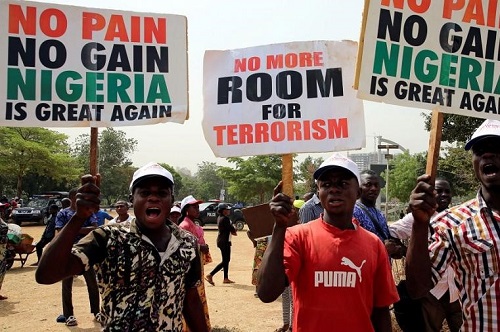Reuters photo
By
Jerome-Mario Utomi
Experience is ‘not what happened to you; it is what you do with what happens,’ and its usefulness essentially manifests in the development of the capacity to escape the guilt of the past and anxiety for the future.
Indeed, Nigerians like the generality of mankind know how important this teaching is to human existence, but politically, the benefits are still low with little to build on or celebrate; a fault traceable to the nation’s non-application of previously gained knowledge to present political and socioeconomic predicaments.
As we know, ‘knowledge is neutral’ and could be used either profitably or destructively. And our emphasis as a nation on the former has created a faulty perception that mirrors Nigerians (leaders and masses alike) before the watching world as a people that listen without being attentive and painted our country as a nation where ‘a stitch in time saves nine’ is fast losing its meaning.
This new awareness is predicated on the record of two recent developments on our political geography- first, the Federal Government’s planned re-dramatization of operation python dance across the country in the name of providing security.
The second and most surprising is the masses new found love for, and reliance on political prophecies as against programmes/issues for an informed political decision about the forthcoming general election.
Crucially, Nigerians must acknowledge the spoken resolve by the government to curb insecurity in the country, particularly the activities of the Boko Haram sect in the North-East. The nation must also appreciate Mr. President’s recognition during his New Year message that Nigerians desire/deserve peace, security, prosperity, inclusiveness, and infrastructural development as well as his promise to build a country in which the resources are utilized for the benefit of the largest number, and not appropriated by a privileged few in their never-ending quest to satisfy their greed.
However, the FG’s recent decision, despite the growing concerns/unpalatable experiences in the past, to reintroduce operation python dance across the country – a military exercise in preparation against security challenges anticipated before, during and after the 2019 general election, is but a pragmatic proof that our political system is truly reputed for not engaging the best minds in our country to help get answers and deploy the resources we need to move into the future.
In taking such decisions, one major aspect the FG failed to remember is that the nation has traveled this road too many, journeyed through this part consistently without results or a decision to make a detour –in spite of unenthusiastic signals and feedbacks from the targeted ‘beneficiaries’ of these operations.
There are countless examples of military/civilian clashes occasioned by such interventions.
Apart from the recent avoidable clash between the Shi’ite Islamic group in Abuja that left dozens of the protesting members of the group dead, others that come to mind include but are not limited to a similar visit by the Nigerian army to the southeastern part of the country to watch the python dance, to the south-south to witness the ‘ugly’ crocodile smile, and another episode codenamed “Operation Octopus grip” as declared by the Nigerian Navy in the Niger Delta region.
Lamentably, these ‘dances, smiles, grips’ or attacks on the media organizations shared but a common outcome called chaos as well as having a way of leaving in its trails sorrows, tears, and blood.
Very instructive, however what the watching world in my view should have expected from this administration is but an appraisal of the entire process to ascertain if the strategy as used in the past achieved the premeditated result.
What is even most frightening is that when you boil down precisely what set the stage for this appalling situation, the painful reality is that the culture of not learning from past events is not peculiar to the government.
As an illustration, Nigerians, judging from their comments, continue to vilify the present administration for the country’s real and imagined woes in the political, socioeconomic, security and cultural spheres, as if it was the making of the President alone.
This in my view cannot be so as the vibes about the forthcoming general elections portray a people not prepared to challenge the political status quo.
Adding context to this discourse, in the electioneering period, like every non-violence campaign, a collection of facts in order to establish whether injustice is alive is the first task expected of the people.
But as the nation draws near to the February 2019 general elections; it appears there is something different.
Whereas overbearing confidence is found in quantum, and forms a common denominator among politicians, despite Mr. President’s recent statement that elections need not be a do or die affair or approached with trepidation and mortal fear, Nigerian electorate/voters have become a weak and ineffectual voice with an uncertain sound laced with an inability to test the propositions presented or explore the facets of policies not revealed by the politicians, hence relying solely on religious leaders for political/electoral prophecies.
Why this should be a source of worry to all is that it was a similar behavior in the past that made the masses lose the political playing field, turned our democracy to ‘responsibility-free’ and transcended voters’ assent to a commodity that could be purchased by the highest bidder- call it vote buying if you like.
The fear is that if the masses fail to apply their recently gained electoral experience, the effect may be worse than previous years.
For instance, it will further prevent the country from enthroning true democracy that would herald a corruption free nation where the rule of law will be obeyed to the letter and impunity on the part of all top government officials, civil servants and every other person in either the public service or the private sector curbed.
For the nation to breathe a sigh of relief, Nigerians must in the forthcoming general elections do away with deformed ideas, values, assumptions, beliefs, and understandings that prevent them from seeing reason(s) to rise from the ‘bondage of half-truth’ to the unfettered realm of objective political appraisal.
Again, achieving a re-emergence of a fully functional democracy come February, what we need is not a new theory, concept or framework, but willingness to think strategically and elect people that recognize the fact that it takes a prolonged effort and discipline to administer a country well; people who are integrative problem solvers and can clearly meet the people’s needs better than the available alternatives.
Finally, on the Nigerian Army/Daily Trust Newspapers face-office, it will be highly rewarding if the Military PR unit go a step further to develop a cordial/asymmetrical relationship with the media as this incessant clampdown has prompted Nigerians with a critical interest to conclude that the spirit of the infamous Decree 4 still pervades the nation’s political geography.
Jerome-Mario Utomi
Jerome-Mario is a Social Entrepreneur and an alumnus, School of media and communication, Pan Atlantic University, Lagos, Nigeria.



No Comments Yet!
You can be first to comment this post!